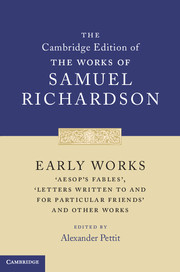Book contents
- Frontmatter
- Dedication
- Contents
- General Editors’ Preface
- Acknowledgements
- Chronology
- List of Abbreviations
- General Introduction
- Textual Introduction
- The Apprentice’s Vade Mecum (1733)
- A Seasonable Examination of the Pleas and Pretensions (1735)
- Preface to Aubin, A Collection of Entertaining Histories and Novels (1739)
- Aesop’s Fables (1739)
- Letters Written to and for Particular Friends (1741)
- Six Original Letters Upon Duelling (1765)
- Appendix: The Infidel Convicted (1731)
- Postscript
- Emendations
- Word-division
- Bibliographical Descriptions of Early Editions
- Explanatory Notes
- Index
Letter XLIV
Published online by Cambridge University Press: 30 June 2022
- Frontmatter
- Dedication
- Contents
- General Editors’ Preface
- Acknowledgements
- Chronology
- List of Abbreviations
- General Introduction
- Textual Introduction
- The Apprentice’s Vade Mecum (1733)
- A Seasonable Examination of the Pleas and Pretensions (1735)
- Preface to Aubin, A Collection of Entertaining Histories and Novels (1739)
- Aesop’s Fables (1739)
- Letters Written to and for Particular Friends (1741)
- Six Original Letters Upon Duelling (1765)
- Appendix: The Infidel Convicted (1731)
- Postscript
- Emendations
- Word-division
- Bibliographical Descriptions of Early Editions
- Explanatory Notes
- Index
Summary
A more pressing and angry Letter from a City Dealer on the same Account.
Mr. Barret,
I am sorry your ill Usage constrains me to write to you in the most pressing manner. Can you think it is possible to carry on Business after the manner you act by me? You know what Promises you have made me, and how from time to time you have broke them. And can I depend upon any new ones you make? If you use others as you do me, how can you think of carrying on Business? If you do not, what must I think of a Man who deals worse with me, than he does with any body else?—If you think you may trespass more upon me, than you can on others, this is a very bad Compliment to my Prudence, or your own Gratitude. For surely good Usage should be intitled to good Usage. I know how to allow for Disappointments as well as any Man; but can a Man be disappointed for ever? Trade is so dependent a thing, you know, that it cannot be carried on without mutual Punctuality. Does not the Merchant expect it from me, for those very Goods I send you? And can I make a Return to him, without receiving it from you? What End can it answer to give you Two Years Credit, and then be at an Uncertainty, for Goods which I sell at a small Profit, and have not Six Months Credit for myself? Indeed, Sir, this will never do. I must be more punctually used by you, or else must deal as little punctually with others; and what then must be the Consequence?—In short, Sir, I expect a handsome Payment by the next Return, and Security for the Remainder; and shall be very loth to take any harsh Methods to procure this Justice to myself, my Family, and my own Creditors. For I am, if it be not your own Fault,
Your faithful Friend and Servant.
- Type
- Chapter
- Information
- Early Works'Aesop's Fables', 'Letters Written to and for Particular Friends' and Other Works, pp. 372Publisher: Cambridge University PressPrint publication year: 2011

